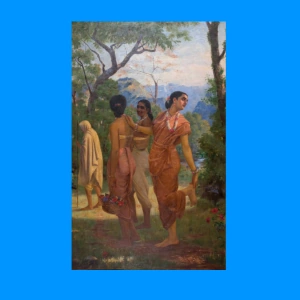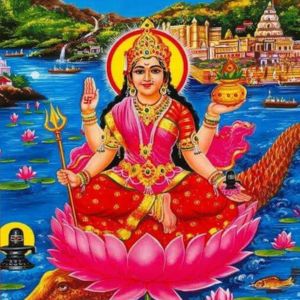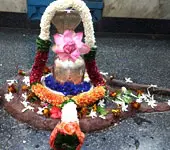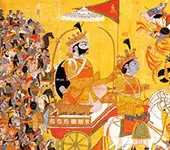Shakuntala - Story of Love, Fate, & Self-Respect
Listen to the audio above

Story of Shakuntala is about a woman's courage and resilience in the face of adversity. Follow her journey as she reclaims her identity and dignity, and teaches us that no matter what life throws at us, we should never lose hope.
The story of Shakuntala and Dushyanta is part of Sambhava Parva of the Mahabharata.
Why is this story there in the Mahabharata?
Because it is the story of the birth of King Bharata.
Janamejaya asked Vaishampayana to tell him about the origin of Kuru Vamsha.
And this is the story that Vaishampayana told him.
King Dushyanta belonged to the great Puru Vamsha.
He was very valorous and ruled over the entire Bharata Varsha.
In his kingdom, there were no sinners and criminals.
Every single citizen was straightforward and honest.
They had enough money for their needs.
The land was fertile, and the rains were on time.
Everyone was happy with Dushyanta’s rule.
One day, Dushyanta went hunting along with his army.
He saw the ashrama of Kanva Maharshi on the banks of River Malini.
He left his army behind and entered the ashrama premises.
He couldn’t find anyone, so he called up -’ Is anyone here?’
A beautiful girl wearing the clothes of a tapasi appeared.
She asked politely, ‘Who are you? May I know the purpose of your visit?’
Dushyanta said, ‘I am the king of Hastinapur. I have come to get darshan of the Maharshi.’
She said, ‘He has gone to the forest to get some fruits; will come back soon.’
The girl was Shakuntala.
Dushyanta asked her, ‘Who are you? What is a pretty girl like you doing in the forest.’
‘I am known as the daughter of Kanva Maharshi.’
‘But I have heard that Kanva Maharshi is a brahmachari. How could he have a daughter?’
‘I will tell you what I know’
‘Rishi Vishwamitra was observing tapas in this forest.’
‘Indra thought if Vishwamitra becomes powerful through tapas, then it might be a threat to his position.’
‘So he sent Menaka to distract Vishwamitra.’
‘Kamadeva created the right ambience and Menaka accomplished her mission.’
‘Vishwamitra and Menaka started living together and she gave birth to a baby girl.’
‘As soon as she was born, Menaka left her near River Malini and went back to Swarga.’
‘The girl was protected by birds until Kanva Maharshi found her.’
‘Maharshi took her ashrama and brought her up like his own daughter.’
‘That’s me; that’s my story.’
‘Birds are called shakunta in Sanskrit.’
‘Since I was found among birds, Maharshi named me Shakuntala.’
‘For me, Kanva Maharshi is my father.’
‘Will you marry me?’. Asked Dushyanta.
‘We will do Gandharva vivaha right now.’
‘I will place my entire kingdom at your feet.’
Shakuntala blushed and said, ‘Wait till my father comes back. He will get me married to you in the proper way as kanyadanam.’
‘There is no need to wait for anyone. You love me. I love you. That’s good enough.’
‘Atma is the best friend of Atma. Only your own Atma can take you ahead.’
‘You can perform your own kanyadanam. There is no need to wait for anyone.’
‘It is not against dharma shastra.’
Shakuntala was convinced.
Their Gandharva vivaha took place then and there.
Before leaving, Dushyanta assured her, ‘I shall dispatch a grand procession to bring you to my palace. You deserve nothing less than the treatment of a queen.’
When Kanva Maharshi came back, he through his divine vision understood what had happened.
He told Shakuntala, ‘Don’t worry, you have done nothing wrong.’
‘Gandharva vivaha is not inappropriate for Kshatriyas.’
‘And Dushyanta is a dharmatma and mahatma.’
‘Your choice is not wrong.’
‘The son of you both will become an emperor.’
Months went by.
Shakuntala gave birth to a son.
He was named Sarvadamana.
When he grew up, Kanva told Shakuntala, ‘It is time for him to become the yuvaraja. Take him to his father.’
He instructed his disciples to take them both to Hastinapur.
Shakuntala entered Dushyanta’s court and told him, ‘Here is your son. Please perform his abhisheka as yuvaraja as you had promised.’
Dushyanta asked, ‘Who are you, cunning woman?’
‘I don’t know you.’
‘What is this all about?’
Shakuntala was completely taken aback.
She started shivering with anger and pain.
Her eyes turned red.
She controlled herself and told Dushyanta, ‘You are known to be a great dharmatma.’
‘Why are you acting like this? You know everything.’
‘You know very well who is lying here.’
‘This is wrong.’
‘This is sin.’
‘Your conscience knows who I am.’
‘I am a pativrata; if you say that I am lying, your head will break into a hundred pieces.’
‘You are insulting me in front of everyone.’
‘Wife is the better half of the husband.’
‘She is the foundation of dharma, artha, and kama for him.’
‘He can not do any dharmik activity without her.’
‘If his wife is there with him, he would find comfort even in the middle of a jungle.’
‘When he is sad, she consoles him like a mother.’
‘She guides him in moral conduct like a father.’
‘You should learn how to behave with your wife.’
‘Not only me, you are insulting your son as well.’
‘A son is a mirror image of your own Atma.’
‘A son is the rebirth of yourself through the body of the mother.’
‘And you are insulting him.’
‘There was an oracle when this boy was born that he would perform 100 Ashwamedha yagas.’
‘My mother deserted me as soon as I was born.’
Now, even you are deserting me.’
‘What sin must I have done in my past birth to suffer like this!’
‘I will go back but at least accept your son.’
Dushyanta said, ‘I don’t believe a single word you are saying.’
‘I have nothing to do with this boy.’
‘You both get out of here.’
That was when Shakuntala's self respect flared up.
‘You are just an ordinary human being.’
‘My mother is respected even by Devatas.’
‘I move about in the sky while you can just crawl on the earth.’
‘I have free entry into the palaces of Indra, Kubera, Yama, and Varuna.’
‘That’s my status.’
‘There is no comparison between me and you.’
‘Even after seeing the brilliance on this boy’s face, if you don’t realize that he is your son, then you are the biggest fool in the world.’
‘But you are insulting him.’
‘Devatas would take away the power and prosperity of people like you.’
‘A son is like a boat that would take his parents to the other shore of this ocean called the world.’
‘Don’t ignore observance of rajadharma.’
‘Cheating doesn’t suit good kings.’
‘Be honest.’
‘Someone who sticks to the truth is nobler than someone who has performed 1000 Ashwamedha yagas.’
‘Observance of honesty is the greatest merit.’
‘Truth itself is Parabrahma.’
‘We are leaving now.’
‘My son will become the greatest emperor on earth even without you.’
At that time an oracle was heard -
‘Shakuntala is telling the truth.’
‘She is your wife and this boy is your son.’
‘Accept your son and take care of him.’
‘Do his bharana.’
‘Because you will be doing his bharana, he will become famous as Bharata.’
‘This is an order from the Gods.’
Dushyanta told those present in the court -
‘Have you heard?’
‘This is the truth.’
‘I always knew this.’
‘I did not want to show that I accepted this boy as my son just on the words of Shakuntala.’
‘Then someone could challenge his legitimacy in the future.’
‘Now the Gods themselves stand witness to this.’
He told Shakuntala -
‘I apologize for being harsh with you.’
‘Now you know why I had to do it.’
This is how Bharata became the king of Hastinapur.
He expanded his empire to the entire Bharata Varsha.
His descendants became known as Bhaaratas.
Their story became famous as Mahabharata.
You must have heard the same story narrated by Kalidasa - Abhijnana Shakuntalam.
It is slightly different.
Even for Kalidasa, the source had been this Shakuntalopakhyanam from Mahabharata.
He applied his imagination and creativity and expanded it.
That’s what poets do.
Mahabharata doesn’t talk about the curse of Durvasa to Shakuntala.
Mahabharata says that Dushyanta feigned ignorance.
In the hope that some miracle would happen to establish the truth.
Mahabharata is all about giving clarity on dharma.
That is Sage Vyasa’s purpose.
Here, see, through the story of Shakuntala he is talking about the dignity and importance of women, how a man should treat his wife, the father-son relationship, and the supremacy of truth.
That is Mahabharata.
FAQs
What is the moral lesson of the story of Shakuntala?
The moral lesson of the story Shakuntala is to remain true to oneself and to never give up hope. It also teaches us that even in difficult times, the truth will always prevail. Women should be treated with dignity and respect.
How did Shakuntala lose her ring?
According to Abhijnana Shakunatalam, on her way to Hastinapur, Shakuntala had to travel by boat. When she dipped her hand playfully in the water, the ring slipped off and fell into the river.
What is the main theme of Shakuntalam?
The main theme of Shakuntala is the resilience and self-respect of a woman. Even the Gods themselves were moved to intervene on her behalf to ensure that the truth was revealed and justice was served.
Is Shakuntalam a tragedy?
No. The story of Shakuntala has a happy ending. Truth prevails and Dushyanta accepts her son as his successor to his kingdom.
What kind of character is Shakuntala?
Shakuntala is an inspiration to us all. She was able to overcome the obstacles that she faced and emerged stronger than ever. She is a symbol of strength, courage and determination. Her perseverance and determination helped her find a way to reunite her family. Her story teaches us to never give up, no matter how difficult the situation may seem. Her resilience and self-respect are qualities we can all strive to emulate.
Why did Dushyanta leave Shakuntala?
According to Abhijnana-Shakuntalam, Durvasa cursed Shakuntala and this made Dushyanta forget her. He forgot that she was his wife through Gandharva-Vivaha. According to Mahabharata, he was only pretending that he didn’t know her. This was to establish her legitimacy through a much higher authority, an oracle.
Why did Durvasa curse Shakuntala?
When Durvasa visited Kanwa’s ashrama, Shakuntala did not notice him. She was lost in the thoughts about Dushyanta. Durvasa cursed that whoever she was thinking about, would forget her.
Who wrote Shakuntala's story?
Shakuntala’s story was originally written by Sage Vyasa and it is part of the Mahabharata. Mahakavi Kalidasa using his imagination and creativity, expanded it into the world famous Abhijnana-Shakuntalam.
Quiz
Who fell in love with Shakuntala?Other languages: Hindi
Recommended for you
Mantra For Protection From Snakebite

नर्मदायै नमः प्रातः नर्मदायै नमो निशि। नमोऽस्तु नर्मदे �....
Click here to know more..Who Is The Supreme God In Hinduism?

Hinduism is a complex religion with many gods and goddesses, but who is the supreme god? Discover the answer to this question.....
Click here to know more..Tandaweshwara Stotram

vri'thaa kim samsaare bhramatha manujaa duh'khabahule padaambhojam duh'khaprashamanamaram samshrayata me. iteeshaanah' sarvaanparamakarunaa- neeradhir....
Click here to know more..
English Topics
Mahabharatam
Click on any topic to open
- 95 What is behind Calling the Five Brothers the Pandavas
- 94 Give up an Individual IF....
- 93 Fascinating Birth Story of the Kauravas
- 92 Overcoming Grief - Lessons from King Senajit's story
- 91 Yayati's Wisdom
- 90 Yayati's Story
- 89 Brahmacharis Can Bless And Curse
- 88 Human Nature - Comples Mix Of Good And Bad
- 87 Results Of Good Karma
- 86 What Gives Results - Luck or Effort?
Please wait while the audio list loads..
30
Ganapathy
Shiva
Hanuman
Devi
Vishnu Sahasranama
Mahabharatam
Practical Wisdom
Yoga Vasishta
Vedas
Rituals
Rare Topics
Devi Mahatmyam
Glory of Venkatesha
Shani Mahatmya
Story of Sri Yantra
Rudram Explained
Atharva Sheersha
Sri Suktam
Kathopanishad
Ramayana
Mystique
Mantra Shastra
Bharat Matha
Bhagavatam
Astrology
Temples
Spiritual books
Purana Stories
Festivals
Sages and Saints
